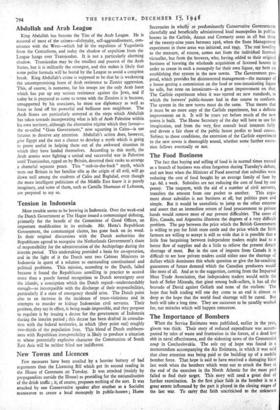Abdullah and Arab League
King Abdullah has become the Tito of the Arab League. He is accused of most of the crimes—disloyalty, self-aggrandisement, con- nivance with the West—which led to the expulsion of Yugoslavia from the Cominform, and today the shadow of expulsion from the League hangs over Transjordan. It is not a particularly alarming shadow. Transjordan may be the smallest and poorest of the Arab States, but it is militarily the strongest, and this makes it likely that some polite formula will be found by the League to avoid a complete break. King Abdullah's crime is supposed to be that he is weakening the uncompromising front of Arab resistance to Zionist aggression. This, of course, is nonsense, for his troops are the only Arab force which has put up any serious resistance against the Jews, and if today he is prepared to come to terms with the Zionists it is because, unsupported by his associates, he must use diplomacy as well as force to fend off his powerful and bellicose new neighbour. The Arab States are particularly annoyed at the steps which Abdullah has taken towards incorporating what is left of Arab Palestine within his own territory, although the alternative regime which they favour— the so-called "Gaza Government," now squatting in Cairo—is too fatuous to deserve any attention. Abdullah's action does, however, give Egypt and the rest a chance to develop a myth which is going to prove useful in helping them out of the awkward situation in which they have landed themselves. According to this myth, the Arab armies were fighting a united and successful war in Palestine until Transjordan, egged on by Britain, deserted their ranks to arrange a shameful separate peace. This " stab-in-the-back " myth, which trots out Britain in her familiar role as the origin of all evil, will go down well among the students of Cairo and Baghdad, even though the more intelligent politicians of the Middle East know it is purely imaginary, and some of them, such as Camille Shamoun of Lebanon, are prepared to say so.


































 Previous page
Previous page